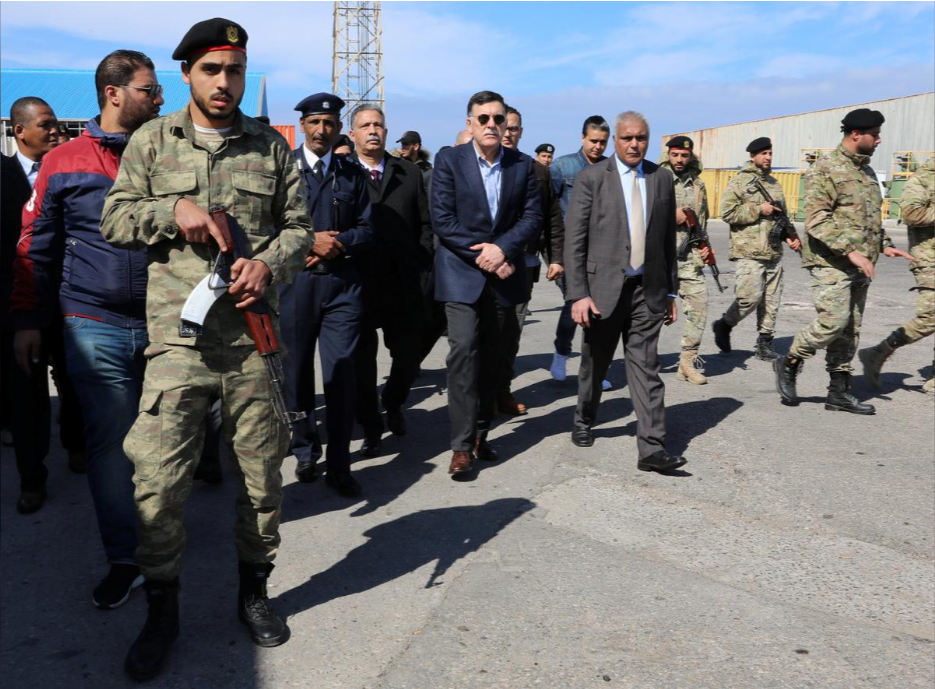
Fayez Mustafa al-Sarraj, Libya's internationally recognized government's Prime Minister, visits Tripoli port after an attack, in Tripoli, Libya, February 19, 2020. /Reuters
Fayez Mustafa al-Sarraj, Libya's internationally recognized government's Prime Minister, visits Tripoli port after an attack, in Tripoli, Libya, February 19, 2020. /Reuters
Fayez Mustafa al-Sarraj, the prime minister of Libya's internationally recognized Government of National Accord on Wednesday dashed hopes of quickly reviving UN ceasefire negotiations after his side withdrew, saying talk of them resuming had been overtaken by events as eastern forces continued to shell the capital.
Ghassan Salamé, UN Secretary-General's Special Representative for Libya, was trying to convince the Tripoli delegation to stay in Geneva and resume indirect talks earlier on Wednesday, the UN confirmed to Reuters.
"As long as these violations are frequent, it's very, very hard to think of quiet negotiations between the two parties on any one of the three tracks we are trying to push forward," said Salamé.
The UN envoy, who is facilitating discussions of the parties to the Libyan Joint Military Commission, or the 5+5 talks, added that an arms embargo on Libya has continued to be violated in the North African nation.
Related reading:
'A joke' - UN representative slams Libya arms embargo
The eastern-based Libyan National Army (LNA) of Khalifa Haftar, which shelled on Tuesday the port of the capital city, ruled out a truce with "terrorists" and "Turkish invaders," suggesting a near year-long battle will continue.
The port is a major entry gate for wheat, fuel and food imports but also an arrival point for Turkish vessels sending arms, drones, trucks and soldiers to help Prime Minister Fayez Mustafa al-Sarraj fend off the offensive of the LNA, which is supported by the United Arab Emirates, Egypt, Jordan and Russian mercenaries.
The conflict has cut oil exports by one million barrels a day and could deepen a security vacuum that would be exploited by Islamist militants and human traffickers dispatching migrants by boat to Europe.
The Tripoli government left the ceasefire talks late on Tuesday and a defiant Sarraj, visiting the shelled port on Wednesday, rebuffed calls to return immediately to the negotiation table.
"There must first be a strong signal from all international players who are trying to talk to us," he told reporters, saying this also applied to parallel discussions focused on political and economic issues.
He suggested fighting was likely to continue: "We have an even stronger signal than that, which is defending our people."
Photographs showed containers in the port with large black holes in them. The National Oil Corporation and United Nations said shells had almost hit a highly explosive gas tanker.
Nearly nine years after rebel fighters backed by NATO air strikes overthrew dictator Muammar Gaddafi, Libya still has no central authority. The streets are controlled by armed factions, with rival governments based in Tripoli and the east.
"We really want a ceasefire and serious negotiations to end the war for the sake of all Libyans," Jalal al-Bosairi, a 45-year-old businessman, said in a Tripoli cafe.
Since the LNA marched on Tripoli nearly a year ago, fighting has displaced 150,000 people.

Ghassan Salamé, Special Representative of the Secretary-General and Head of the UN Support Mission in Libya, briefs the press during the meeting of the 5+5 Libyan Joint Commission, in Geneva, Switzerland, February 18, 2020. /UN
Ghassan Salamé, Special Representative of the Secretary-General and Head of the UN Support Mission in Libya, briefs the press during the meeting of the 5+5 Libyan Joint Commission, in Geneva, Switzerland, February 18, 2020. /UN
Difficult truce talks
A second round of talks involving military officers of both sides began in Geneva on Tuesday following a summit in Germany a month ago involving countries with major stakes in the conflict.
Jean El Alam, spokesman for the UN Libya mission, confirmed that "Delegations are still here (in Geneva) and Dr. Salamé has a meeting today with the head of the GNA delegation," referring to the Tripoli-based Government of National Accord.
The Geneva meetings have so far been held in different rooms. Another round of political talks is scheduled next week in Geneva.
LNA spokesman Ahmed Mismari said his forces had decided to send a delegation to Geneva. But he added: "There will be no peace, talks or ceasefire with terrorists and Turkish invaders."
Russian Defense Minister Sergei Shoigu met with Haftar and they agreed a political settlement is the only option for Libya, RIA news agency said on Wednesday.
The latest attack on Tripoli is part of an emerging pattern amounting to an apparent power play by Haftar.
His forces last month shut down Libya's main oil ports as European and Arab powers and the United States were meeting with his supporters in Berlin to try to halt the Tripoli fighting.
LNA supply routes are less exposed than those of the GNA as eastern airports and seaports are out of range of the Turkish combat drones used by the Tripoli government.
In contrast, the LNA uses UAE-supplied drones which cover the whole country, although there have been no air strikes for weeks as Turkey has installed sophisticated defenses.
Salamé appealed for an open-minded approach from both parties, suggesting that concessions needed to be made concerning the return of former fighters to the communities.
Specifically, this involved deciding on what kind of military monitoring was needed, who was going to do it and whether they would be armed or unarmed.
Further questions include deciding what to do with the large amount of heavy weaponry in Libya, what should happen to non-regular fighters, and who should be in charge of the police force.
(With input from Reuters)